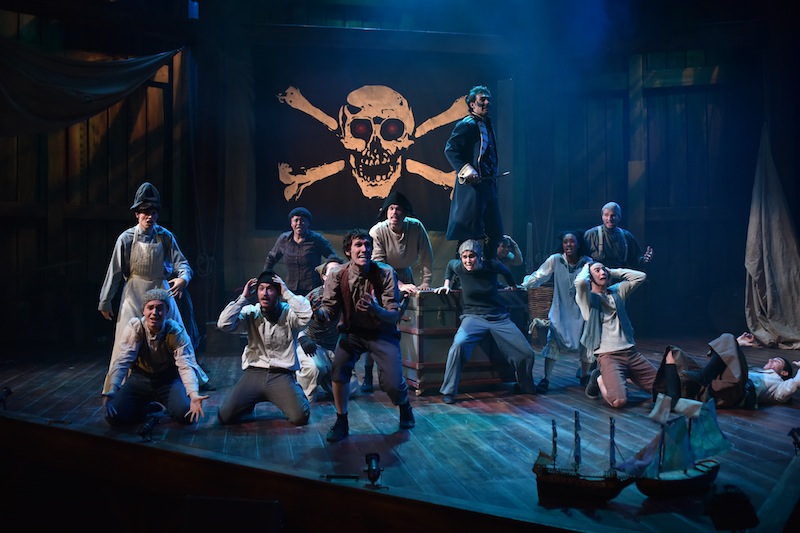Review: UM’s Peter and the Starcatcher celebrates joyful child’s play
Once upon a time ....
All good stories start that way.
The University of Michigan School of Music, Theatre & Dance is presenting one of those timeless stories told from a different perspective.
Peter and the Starcatcher is a rollicking prequel to J.M. Barrie’s famous play of eternal youth, Peter Pan. Rick Elice’s play, based on a snarky young adult novel by Dave Barry and Ridley Pearson, is a play about play, child’s play. It’s about taking on different roles, imagining far away places where adults are the enemy, leaping about and sword fighting, rude body humor, scary scenes and, of course, all’s well that ends well happy endings.
It’s not technically a musical but there is a lot of lively music and a few pirate songs and a mermaid song created for the show by Wayne Barker.
Best of all it’s a great piece of theater that stays loyal to Barrie’s original play, full of pirates and a tribe of, well, disgruntled chefs and three lost boys. And this time around, there’s a girl who tells good night stories, but only when she has time away from saving the world and rescuing a nameless young boy from unhappiness.
Review: UMGASS Ensorcells Again with The Sorcerer

This weekend, the University of Michigan Gilbert and Sullivan Society (UMGASS) presents their fall production of The Sorcerer at the Lydia Mendelssohn Theater. I love Gilbert & Sullivan, but I've only seen The Sorcerer a few times over the years, so I was eager to see what UMGASS would bring to the show that established the template for more famous G&S operettas.
While UMGASS focuses, to my delight, on relatively traditional productions of these hallowed works, they always bring a little something new, and in this production, Artistic Director Lori Gould has taken the rather bold step of adding a new character. I stowed my pitchfork after it became immediately clear that the addition of a comedic Sorcerer's Assistant was a brilliant choice, adding lots of laughs and clever moments without taking any untoward liberties with the source material. Don't get me wrong, there are definitely some liberties being taken, but all in the audience agreed that such liberties were entirely toward.
Review: Theatre Nova's 'Sugar Plum Panto'

One of my favorite moments in Friday’s preview performance of Theatre Nova’s new Sugar Plum Panto was unscripted.
Actress Sarah Briggs asked the crowd what was on their Christmas lists this year. When a man jokingly answered, “A girlfriend,” Briggs cocked her head, pursed her lips, made a small “go get ’em” gesture, and said in a low, sympathetic voice, “Hang in there, Tiger.”
Pantos, of course, are a longstanding British holiday tradition, but they’ve also recently taken root at Theatre Nova, beginning with last year’s An Almost British Christmas. Pantos take a familiar children’s story and give it several silly twists and updates, integrating physical comedy and childish humor with more sophisticated, cheeky, and timely jokes for adults, thus drawing families all together for a night at the theater. Panto audience members are encouraged to boo and hiss when the villains appear, and candy is thrown to the kids in the crowd a few times, making for a loose, chaotic-but-fun atmosphere.
Preview: The Saline Area Players present 'The Best Christmas Pageant Ever'

“The Herdmans were absolutely the worst kids in the history of the world. They lied and stole and smoked cigars (even the girls) and talked dirty and hit little kids and cussed their teachers and took the name of the Lord in vain and set fire to Fred Shoemaker's old broken-down toolhouse.” —opening paragraph of The Best Christmas Pageant Ever, the classic 1972 holiday tale by Barbara Robinson.
It is cold here in Ann Arbor the week after Thanksgiving at the end of a highly political and contentious November. Black Friday sales have been stressful and extremely hard on the wallet. It’s time to enjoy some light entertainment.
It’s time for an evening with the horrible Herdmans.
Review: Encore Theatre performs a practically perfect 'Mary Poppins'
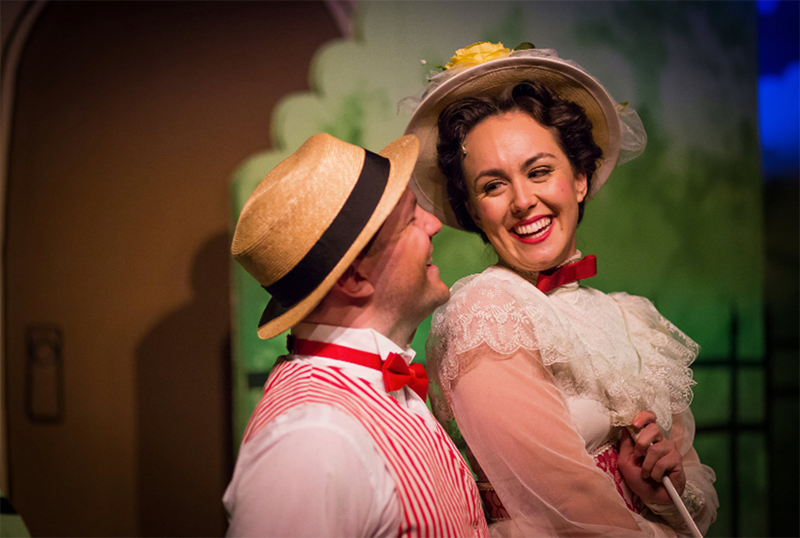
One word sums up the Encore Musical Theatre’s production of Mary Poppins.
You know the word, so sing out.
SUPERCALIFRAGILISTICEXPIALIDOCIOUS!
Encore has chosen the practically perfect musical for the holiday season with just the right mix of song, dance, and magic (and, of course, a spoonful of sugar).
The musical is an adaptation of the beloved 1964 Walt Disney movie based on books by P.L. Travers. The musical’s book by Julian Fellowes (of Downton Abbey fame) follows the basic story from the film but puts a bit more emphasis on the social context of the period, Britain in 1910. A few new songs by George Stiles and Anthony Drewe have been added but pale next to the luminous score of Richard M. and Robert B. Sherman, which are still the songs you’ll leave humming.
The story is simple but has some deeper lessons to convey. The Banks family seems the essence of middle class propriety. Father is an overworked and fusty banker. Mother is a one-time actress who is feeling a bit confined by the tedium of being “the lady of house” with little to do. Their children are getting out of hand and driving off nanny after nanny until Mary Poppins arrives in the knick of time.
Review: Nora Chipaumire’s “Portrait of Myself as My Father”
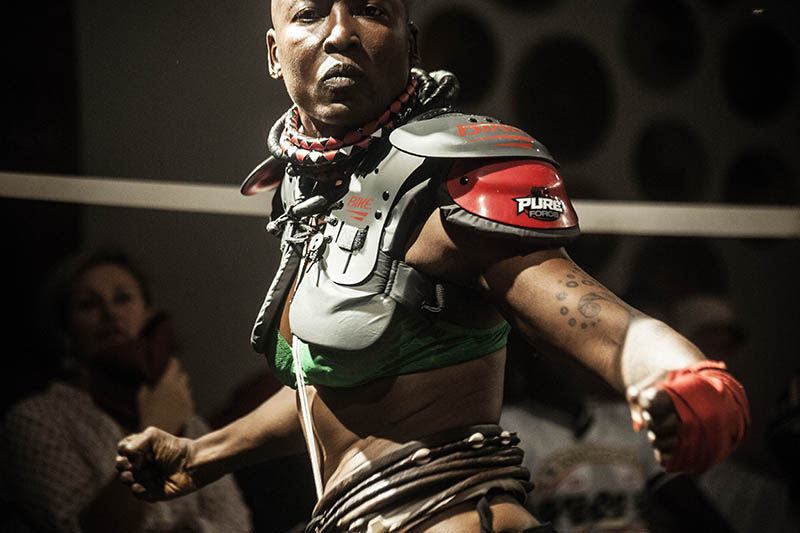
There’s a reason that Nora Chipaumire’s “Portrait of Myself as My Father” earned a spot in University Musical Society’s Renegade series, which highlights cutting edge artists (and works) that take risks.
“Portrait,” an avant-garde dance work conceived, costumed, lit, choreographed, directed and performed (along with Pape Ibrahima Ndiaye, also known as Kaolack, and Shamar Watt) by Chipaumire, is now being presented at Detroit’s Downtown Boxing Gym.
And once audience members enter the performance space – a boxing ring, bordered by red, white, and blue ropes, and surrounded by bleachers on four sides – they immediately confront bright halogen lights, a loud, electronic soundscape, and Chipaumire herself, talking into a boxing microphone that dangles from the building’s rafters.
If you think this doesn’t give you the chance to feel comfortable and settled, you’re right. You won’t. And your heightened alertness will likely be sustained throughout the hour-plus show.
For “Portrait” is all about overwhelming your senses (Philip White’s music ranges from distorted electronica and white noise to pulsing hiphop and drumming, and the room is shrouded in complete darkness, save for the portable halogen worklights, which sometimes shine directly in your line of vision); subverting conventions (like any kind of linear narrative); and collapsing areas of difference, whether it’s time – combining ritualistic African dances with ultra-modern, avant garde movements – or gender. Indeed, Chipaumire, a woman, acts as our guide to black manhood and masculinity while wearing football shoulder pads, a sheer black bra, and low-slung black pants, with a mostly-shaved head.
Ndiaye, meanwhile, is dressed in little more than a pair of red shorts, and he’s the primary subject of Chipaumire’s exploration, charismatically acting out her instructions and observations. Often, her questions slowly build upon each other: “How do you become a man? How do you become a black man? How do you become an African black man?” And both Ndiaye and Chipaumire are connected by cloth tethers that stretch far beyond the boxing ring, as well as to each other, simultaneously suggesting a familial umbilical cord and enslavement.
Tall, lanky Watt acts as more of a one-man stage crew, audience wrangler, and circus ringleader, dressed in a black tailcoat and red track pants, but he plays a larger role within the show as it progresses. During one segment, he wowed the crowd by repeatedly leaping over the boxing rings ropes and onto the floor.
Chipaumire deconstructs black African manhood by breaking it down into gestures, which is to say, specific ways of moving through the world. She states early on that “This is a manifesto about the black African,” and in her artist’s statement in the program, she talks about how personal the piece is. For the piece is inspired by Chipaumire’s experience: she last saw her father when she was five, and he died in 1980. She has since tried to learn more about him, and fill in some of the blanks, but in the end, she can never know him, and she imagines him in a boxing ring, doing battle not only with the forces of the larger world, but within himself.
This leads to an arresting final moment in the show, wherein Chipaumire is seen in the darkness carrying Ndiaye on her back, and Watt asks, “What is this about?” Chipaumire answers that it is about her father, whose carcass she carries with her. It’s a powerful image, and it achieves a fierce intimacy. But I must confess that before this scene, I struggled mightily to fit the show’s pieces together in any kind of cohesive, emotionally impactful way. I’d committed so much energy trying to unlock the show’s mysteries that it ultimately eluded me.
Even so, there are clearly some intriguing, complex ideas driving “Portrait.” Even as Watt repeatedly yells “Champion!” and leads the crowd in applauding Ndiaye, as he goes through the paces of Chipaumire’s sharp demands, you can’t escape the reminder of how often we watch black male bodies perform athletic feats for our pleasure and public consumption.
So some of these thought-provoking, disquieting moments definitely land, but mostly, this “Portrait” inevitably seems blurred.
Jenn McKee is a former staff arts reporter for The Ann Arbor News, where she primarily covered theater and film events, and also wrote general features and occasional articles on books and music.
Portrait of My Father continues Saturday, November 19 at 8:00 pm and Sunday, November 20 at 2:00 pm at the Downtown Boxing Gym in Detroit, 6445 E. Vernor Hwy. Tickets are available here or through the ticket office by calling 734-764-2538. For more information, visit http://ums.org/performance/portrait-of-myself-as-my-father/.
Review: U-M’s 'A Man of No Importance' celebrates theater and love
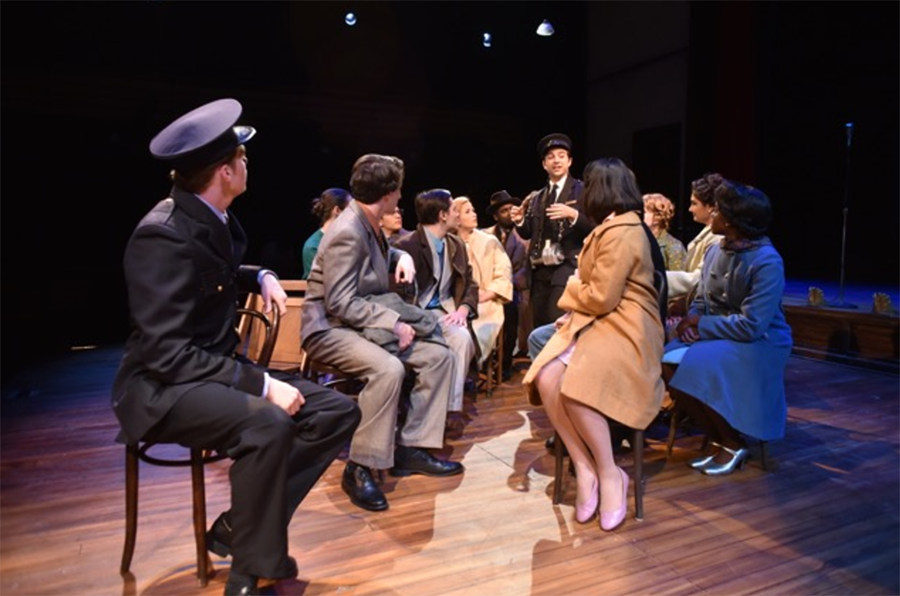
On one level the musical A Man of No Importance is a lovely celebration of community theater and those whose lives become brighter in its spotlight, but in a deeper sense it’s the story of one lonely man’s struggle to find himself and shed light on who he really is.
The University of Michigan School of Music, Theatre and Drama finds the perfect tone for each of these themes in a production that is beautifully performed, capturing the nuances that give this musical its special power.
The musical with book by Terrence McNally, music by Stephen Flaherty and lyrics by Lynn Ahrens is based on a 1994 movie starring Albert Finney and like the film, the musical is set in Dublin, Ireland, circa 1964. It’s a time of change, with musical and cultural influences shaking things up in the British Isles and soon in the world at large. But time moves a bit more slowly in Ireland, where people hold firm to their long held beliefs.
Alfie Byrne works by day as a bus conductor, but his real passion is directing plays. He relies on his friends and neighbors and the folks on the bus to be his star players. He has won some local renown for his production of Oscar Wilde’s The Importance of Being Earnest at St. Imelda’s church hall, but now he wants to stage Wilde’s considerably more controversial Salome.
The flamboyant and sensitive Wilde is Alfie’s hero and a clue to what really bothers Alfie, a homosexual deep in the closet with a growing attraction to his young, golden-haired mate, the bus driver Robbie.
Alfie lives with his loving, dedicated, conservative, nagging sister Lily, who worries about Alfie’s lack of female companionship and about her own sacrifice of happiness to care for her “odd” brother.
All of this could be heavy going, but A Man of No Importance is a funny, sweet and lively portrayal of the love of theater, life in the city and the value of friendship.
Director Vincent J. Cardinal is able to delicately balance the joyous with the morose and make it work. The musical numbers are not big show stoppers but they are well crafted to the needs of the show and are a pleasant mix of up-tempo and gentle. Cardinal and choreographer Aline Mayagoitia give stylish movement even to the rhythm of a bus ride and to a night out in working man’s Dublin. The band under music director Catherine A. Walker gives solid support with a score that uses Irish folk music and instrumentation as measured grace notes.
At the productions center is Barrett Riggins as Alfie Byrne. Riggins gives him a dreamy, distant quality but also shows the warm friendly man who, without realizing it, is a magnet to his friends who find meaning and purpose in the theater he loves. Riggins has the right mix of charm and sadness to make an audience smile and cry and his growing sense of who and what he is develops slowly and delicately. He has several standout musical moments, especially “Man in the Mirror” and the beautiful “Love Who You Love.”
Emilie Kouatchou is a charming, shy and yet strong presence as the girl on the bus who Alfie charms into playing his idealized Salome. She, too, harbors a secret and her performance intelligently foreshadows what is to come. Kouatchou has a fine voice and several good songs especially on the “The Burden of Life” and “Tell Me Why.”
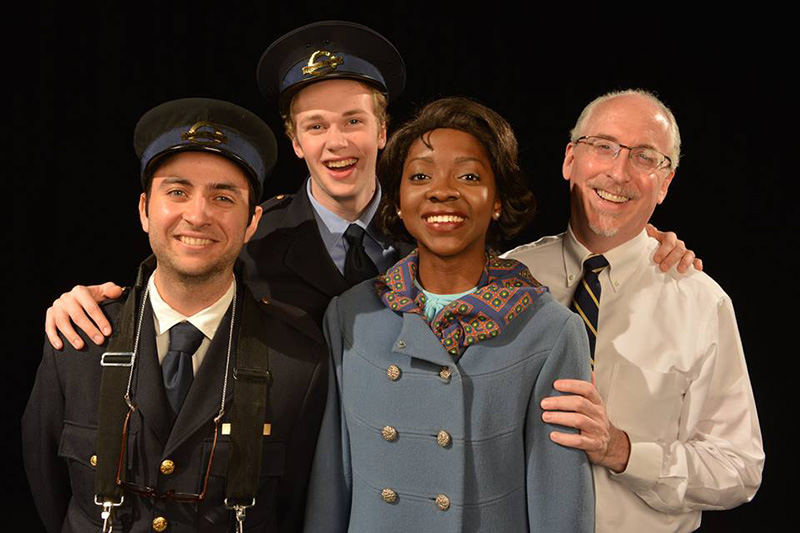
Kat Ward is tough, unrelenting and yet warm and comforting as Alfie’s sister Lily. She won’t stand for any of these modern ideas and Ward plays this side of Lily with fierce determination but matches it with a touching concern for what she sees as her “wayward” brother. She also has a soft spot for the local butcher, and Alfie’s most talented actor, Mr. Carney.
Elliott Styles is excellent as Mr. Carney. He gives strong voice to the theater loving song “Going Up,” a modern take on “There’s No Business Like Show Business.” Mr. Carney loves theater and Alfie’s sister but he is horrified by Wilde’s Salome. In an interesting bit of casting, Styles also plays Alfie’s dream image of Oscar Wilde in all his flamboyant glory.
Robbie, the object of Alfie’s affection, is played with boyish charm by Ben Walker, who leads the cast through a rollicking night out on "The Streets of Dublin" but also shows a sensitive side when he realizes what is happening with his friend.
BJ Myers plays Baldy, another poor soul brought to life by Alfie’s theater. He is a widower who tells Alfie something about love in the bittersweet "The Cuddles Mary Gave." Myers has a fine voice with a unique and effective phrasing.
The play is certainly not sympathetic to the official Catholic church teachings but it makes a clear separation between that and those on the parish level. Sam Hamashima plays a sympathetic, friendly Father Kenny as a sort of balance to the play’s criticism.
The set by Anton Volovsek makes great use of the Miller Theater’s small space in his recreation of a church hall, with a simple stage, a floor that probably doubles as a basketball court, a Sacred Heart of Jesus painting on a wall and heavy sidedoors that provide access points. Spare props fill in for dining rooms and street scenes.
The entire ensemble is excellent, everyone is into their parts completely. Alfie himself couldn’t have dreamed of a better or more dedicated company for his Salome or for a play that shows just how important one man can be to a community.
Hugh Gallagher has written theater and film reviews over a 40-year newspaper career and was most recently managing editor of the Observer & Eccentric Newspapers in suburban Detroit.
A Man of No Importance continues 8 pm Friday, Nov. 18, and Saturday, Nov. 19, and 2 pm Saturday, Nov. 19, and Sunday, Nov. 20, at the Arthur Miller Theatre on the North Campus of the University of Michigan. For ticket information, call (734) 764-2538 or visit online at http://tickets.music.umich.edu.
Preview: Young People's Theater presents 'Crazy For You'
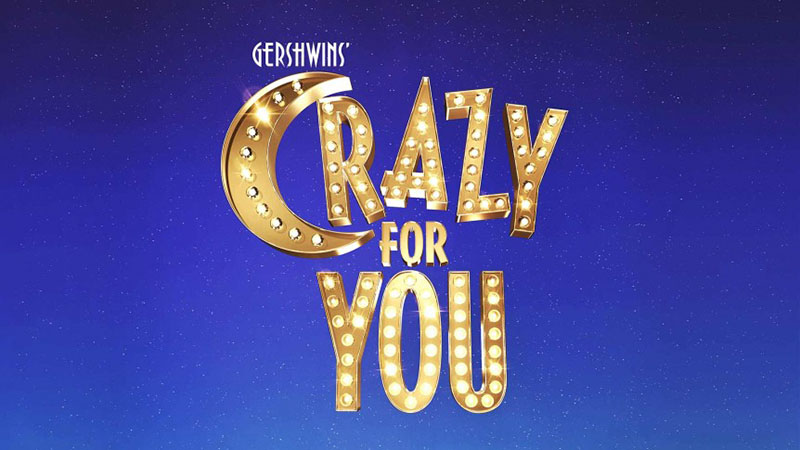
You can’t go wrong with George and Ira Gershwin, especially when you pull together some of their best material from old musicals (“Embraceable You,” “Someone to Watch Over Me,” “I Got Rhythm”) and repackage it with Fred-and-Ginger Broadway glamour, wild west shenanigans, and a wispy thin plot that demands a Mickey-and-Judy let’s-put-on-a-show production number.
Such is the case with 1992’s Crazy for You, with a book by Ken Ludwig, a romantic musical comedy based in part on the 1930 musical Girl Crazy.
The plot, such as it is, centers on Bobby Child, a wealthy Manhattan ne’er-do-well and would-be song and dance man, who ends up in a broke Nevada mining town, falls in love with the local girl, and decides to rescue its bankrupt theater. Directed by Caroline Huntoon, with music direction by Seth King-Gengler and choreography by Erika Jost, Crazy For You is an uplifting jaunt presented YPT style for audiences of all ages.
For more information, visit http://www.youngpeoplestheater.com.
Amy Cantú is a Production Librarian at the Ann Arbor District Library.
YPT’s Crazy for You runs Thursday, November 17 - 20 at the Lydia Mendelssohn Theatre, University of Michigan, 911 N. University, Ann Arbor, Michigan 48109. Tickets available through the Michigan Union Ticket Office (MUTO) by phone: 734-763-TKTS; in person at 530 S. State, Ann Arbor, MI 48109 - UM Michigan Union; or online at http://www.muto.umich.edu.
Preview: Poetry Night in Ann Arbor 11/17

The Neutral Zone in conjunction with the Helen Zell Writers Program at The University of Michigan will present Poetry Night in Ann Arbor 2016 at the Rackham Auditorium at 7 p.m. on Thursday, November 17, 2016.
This annual event celebrates words and ideas and features Ann Arbor’s spectacular youth poets sharing the stage with nationally renowned writers. This year's guest poets include:
Fatimah Asghar is a student in the Hell Zell Writer’s Program, nationally touring poet, performer, photographer, writer and thinker. Her literary work hovers between prose and poetry, examining fact through a lyrical lens. Her work has appeared in POETRY Magazine, Gulf Coast, The Paris-American, The Margins, The Offing, Word Riot, and many others. Her chapbook After was released a year ago on Yes Yes Books.
Chace “Mic Write” Morris is a poet, emcee, educator from Detroit. He is a 2013 Kresge Literary Fellow, 2-time Rustbelt Poetry Slam champion, writer-in-residence with the InsideOut Literary Arts Program & 1/4 of the Hip-Hop collective Cold Men Young. Mic has been featured on Mother Jones & The Grio, and his poetry published or forthcoming in Freezeray Press, Radius, and Muzzle Poetry Journal.
José Guadalupé Olivarez is a Chicano poet and educator. Born on the south side of Chicago, he is a graduate of Harvard University and a teaching artist for Young Chicago Authors. Jose has taught writing workshops and performed at schools, universities, and poetry slams across the country. His work has appeared or is forthcoming in Specter Magazine, The Acentos Review, The Harvard Voice, and Chicago Public Radio.
Sara Wedell is a Production Librarian at the Ann Arbor District Library.
The Neutral Zone and the Helen Zell Writers Program at U-M present Poetry Night in Ann Arbor 2016 at Rackham Auditorium, 915 E. Washington St, Ann Arbor on Thursday, November 17, 2016 at 7 pm. Tickets are $5 for students/$10 general public in advance; and $7 students/$12 general public at the door. To reserve tickets, contact Jeff Kass at eyelev21@aol.com.
Review: HERsay at Pointless Brewery & Theatre
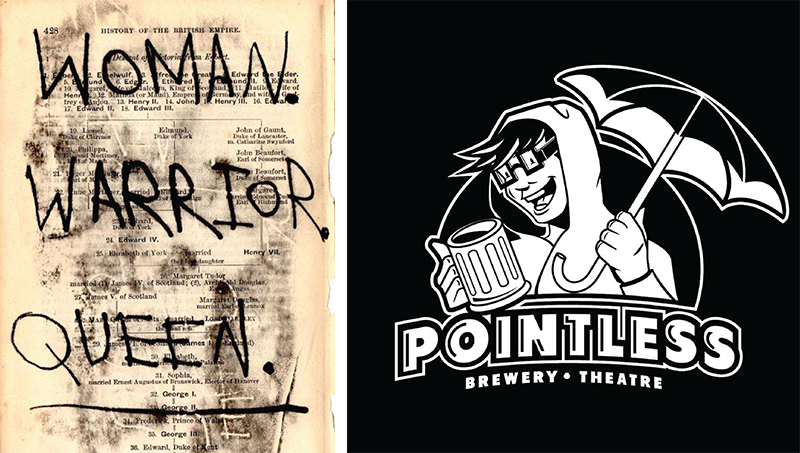
When Patti Smith emailed Pointless Brewery & Theatre Co-founder Tori Tomalia last year to find out if she could collaborate with the venue to hold HERsay there, she expected Tomalia to be skeptical, or at least questioning. But Tomalia was gung-ho for the event right away and the evening of storytelling, comedy, improvisation, theater, and visual art show’n’tell—all created and performed by women—debuted this past Thursday evening for a sold out crowd. Smith was inspired to create HERsay when she heard the story of a former SNL cast member who claimed “women can’t be funny.” She felt that women could most certainly be funny, and wanted to provide an opportunity for women to be heard with the HERsay event, which she now hopes will become an annual celebration of women and the art that they create. This year, half of the proceeds from ticket sales were donated to Planned Parenthood.
HERsay featured twenty different women performers with a range of ages, backgrounds and experience. The best part of the event was the diversity of performances and the emotional ups and downs that each performer created with their work. Jenn McKee delighted the crowd by reading excerpts from her middle school diary, in which she “got in touch with her early nihilism.”
Patricia Wheeler, local coordinator of the Ann Arbor and Detroit Moth StorySLAMs, followed McKee with a heartbreaking story of her fiancè’s suicide that left much of the audience in tears.
Artist Debra Golden displayed her gorgeous paintings of a single street in northeast Detroit, near Martin Park. The houses on the street ranged from multimillion dollar mansions (some now in disrepair) to a tiny 900-square-foot ranch at the end of the block. As Golden shared her memories of Detroit in the 1960s and 1970s, many audience members nodded along, shouting out memories of their own, of roller coasters on Boblo Island and of the Lodge slicing neighborhoods in half.
Later in the evening, Jean Leverich performed a riveting piece about a woman dying of cancer who tries marijuana for the first time in an attempt to ease her pain. She’s delighted by the experience, and Leverich’s stunning depiction of the joy and sorrow that the woman experiences was heart-wrenching.
This writer also particularly enjoyed performance poet Callie McKee, who performed two of her pieces for the HERsay audience. Her witty turns of phrase and animated stage presence were captivating. Her first piece, about preparation, left the audience smiling with the final message that there are some things we simply can’t be prepared for, no matter how hard we try. Her second—and very timely—piece dealt with a “distinctive lack of Hillary,” in the days after the election. Omnipresent in the news in recent months as she ran for president, McKee talked about her surprise after the election when she woke up and Clinton was virtually gone.
A multitude of other storytellers, comics, and artists performed at HERsay, coming together to create a warm, welcoming and positive environment for both the audience and the performers themselves. Pointless Brewery, which opened earlier this year, offered an intimate, friendly venue for the show, the only drawback being its small size—tickets sold out quickly. If the success of Thursday’s show is any indicator, Smith’s dream of HERsay becoming an annual event will surely come to fruition, perhaps on an even grander scale next year.
Elizabeth Pearce is a Library Technician at the Ann Arbor District Library who is much too mortified to revisit her own middle school diary.


